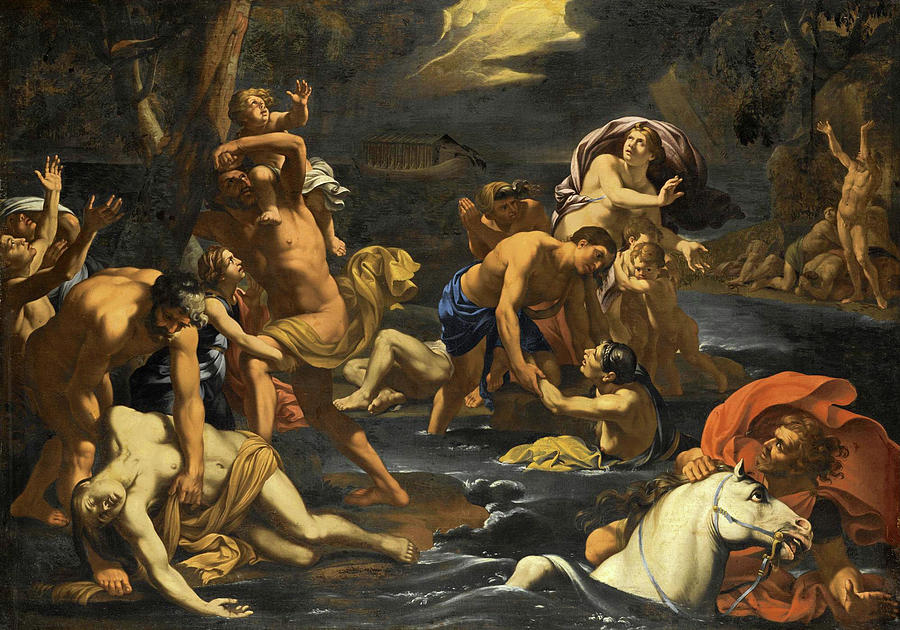 |
| The Great Flood by Nicholas Chaperon. |
A baptism is always a happy occasion for those involved. What could be
more beautiful, more joyful than the reception of a new life into the Church,
the claiming of a human being for the Lord Jesus Christ through rebirth into
God’s family? This joy is reflected in the symbols of the occasion: The Paschal
candle, the little baby in a white baptismal robe, the anointing with oil, the
gentle pouring of water over the baby’s forehead with a seashell. Even aunt
Maud, snapping away with her tablet, is not an annoyance on this occasion.
It is instructive, then, to look into the teachings of the first
Christians to see how they understood baptism. If we do, we will come away
surprised, perhaps even a little shocked, for the early Church’s symbols of
baptism are powerful, violent images; those of the Flood and the Crossing of
the Red Sea. Even Paul, in his letter to the Colossians, sees baptism as a
burial! What led our Fathers in the Faith to conceive baptism in such stark and
violent terms?
We must remember that to confess Jesus Christ as Lord in that era was
to stand under the very present threat of death. For those early Christians,
salvation in Jesus Christ was everything, and in their lives, it really did
take precedence over everything else. They were not prepared to comprise with
the world in the way that many Christians so easily do today. They wanted
eternal life with God above all things, and Nothing would deter them from it. For
them there really was “no other name in heaven or on earth by which we can be
saved” – that is, the name of Jesus.
This was the background against which they saw sin. Sin, for them, was
a disaster. It separates man from God; its corrupts our very nature, and for
them, corruption meant death. They also understood that the problem of evil was
something colossal, beyond our human nature, about which we of ourselves can do
nothing. Our only hope, they believed, is the grace of God, the power of his
mercy, which is infinitely greater than the power of evil. The universal symbol
of both life and purity has always been water, and it was in “salvation by
water” that they saw their only hope.
Thus it was that when they conceived God’s salvation, his destruction
of sin and giving of new life, they did so in terms of water. In the very
beginning, before God creates, there is chaos, and in the Old Testament, chaos
is water. Water can extinguish fire, they said, but who can stop a flood? But
God drives back the water and makes dry land appear, a place for man to live.
And when man became so wicked as to be irredeemable, God allowed the water to re-cover
the earth, destroying the wickedness of the human race, allowing only Noah and
his family to survive in the Ark.
When God leads Israel out of Egypt from slavery to freedom, the
Israelites, by passing in safety through the sea, are “saved by water,” while
the Egyptians, their persecutors, are destroyed by the same waters. The early
Christians saw in both of these cataclysmic events (and the word “cataclysm”
means flood) both the destruction of evil and salvation from it. For them, when
someone was baptised, the water was a symbol of the very real action of the
Holy Spirit coursing through us like a violent flood, destroying sin and
bringing us to rebirth as members of God’s family. In the baptism by total
immersion practiced in Paul’s day, the candidate descended into the water as
though into a tomb, like Jesus after his death, and then rose to new life by
coming up out of the water, as did Jesus in his Resurrection.
Next time you attend a baptism, and the touching scene as described at
the beginning of this reflection is before your eyes, think about the powerful
spiritual event which is the reality of baptism. Recognise that without the power
of God to destroy sin, there is no hope for us. See in the baptism the enormous
reality of our complete dependence on God who is our only hope, and on Jesus
Christ his Son, who won our salvation. And give thanks to God for his precious
gift of eternal life through water and the Holy Spirit.
Fr Phillip.





























